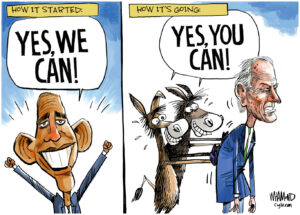The Economy Is Bad Enough
With the nation struggling to recover from a devastating recession, unemployment stuck at crisis levels, financial markets spooked by the possibility of European defaults and consumers disinclined to consume, it makes no earthly sense to suck money out of the economy.
There is no good reason for negotiations on the budget and the debt ceiling to be deadlocked, because the solution is obvious: First, do no harm.
The Hippocratic injunction should be something befuddled economists and warring politicians can agree on. With the nation struggling to recover from a devastating recession, unemployment stuck at crisis levels, financial markets spooked by the possibility of European defaults and consumers disinclined to consume, it makes no earthly sense to suck money out of the economy.
Democrats are right that this is a terrible moment for spending cuts. Republicans are right that this is an awful moment for tax increases. The only reasonable thing to do is kick the can down the road — but in a purposeful, intelligent way.
As a practical matter, this means Republicans must swallow an increase in the debt ceiling and Democrats must accept painful spending curbs that kick in when the economy is off its sickbed. It means conservatives have to be patient in bringing expenditures down and progressives have to be patient in returning tax rates — even for the wealthy — to what many of us consider appropriate levels.
All this is clear — even as much else about the economy and its prognosis becomes increasingly murky.
Indeed, it is reasonable to ask whether the “dismal science” of economics even works anymore as a reliable tool for analysis and prediction. While some economists remain staunch, unwavering disciples of John Maynard Keynes or Milton Friedman, others have begun couching their words. It’s almost as if the laws governing the universe of money have changed.
Two years ago at a seminar, I heard a distinguished economic forecaster confidently explain how the recovery would proceed. While some usually reliable indicators were anomalous and contradictory, he said, the one thing he knew from the historical record was that sharp, deep recessions are followed by steep, roaring recoveries. By the second quarter of 2010, he said, growth would be as high as 4 percent and unemployment would be tumbling. Happy days would be here again.
I won’t embarrass the man by naming him, since he wasn’t much further off base than many of his peers. No economic orthodoxy has come through the past few years unscathed.
At least former Federal Reserve Chairman Alan Greenspan — once a firm, unquestioning believer in deregulation — had the honesty to admit that the 2008 financial meltdown exposed a “flaw” in his ideology and left him “in a state of shocked disbelief.” That’s where the whole economics profession should be.
But even if economists don’t know where the nation and the world are heading, there’s plenty of data to tell us where we are right now. Unemployment was at 9.1 percent in May, up from 9 percent in April. Housing starts were up slightly after having declined sharply the previous month. Retail sales were down a fraction after being up a fraction. Taking a longer view, the economy has clearly improved over the past year — but the improvement is slow, wobbly and fragile.
Given this state of affairs, it’s hard to imagine how taking money out of consumers’ hands — either through cuts in government spending or tax increases — could possibly make things better. It’s easy to see how such measures could make things worse.
Likewise, it’s hard to believe that running trillion-dollar deficits every year is sound policy. Economists who confidently tell us it’s no problem that the national debt is approaching 100 percent of GDP sound as if they’re whistling past the graveyard. I believe it would be a long, long time before the financial markets began to see the United States as a great big Greece, but at some point that day would come.
And how could Congress turn a long-range crisis into an immediate disaster? By stubbornly refusing to raise the debt ceiling, which would be the economic equivalent of a toddler’s temper tantrum.
It’s clear what needs to be done. President Obama and congressional leaders should agree on a series of firm deficit caps that would reduce the debt over time. This must be accompanied by a reasonable increase in the debt ceiling.
Then we will spend years engaged in a difficult but necessary fight over what kind of government we want and how much we’re willing to pay for it. At present, we’re operating a heavily armed, heavily indebted health insurance company — a giant, profligate Aetna or Prudential, with nuclear weapons. That’s not going to win the 21st century.
Eugene Robinson’s e-mail address is eugenerobinson(at)washpost.com.
© 2011, Washington Post Writers Group
Your support is crucial…With an uncertain future and a new administration casting doubt on press freedoms, the danger is clear: The truth is at risk.
Now is the time to give. Your tax-deductible support allows us to dig deeper, delivering fearless investigative reporting and analysis that exposes what’s really happening — without compromise.
Stand with our courageous journalists. Donate today to protect a free press, uphold democracy and unearth untold stories.









You need to be a supporter to comment.
There are currently no responses to this article.
Be the first to respond.